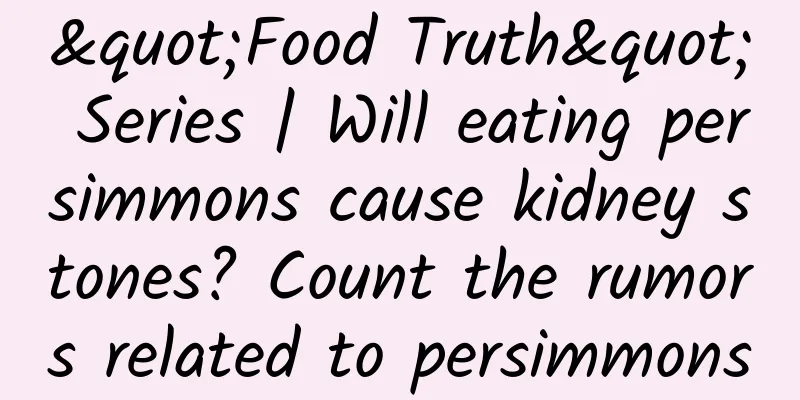"Food Truth" Series | Will eating persimmons cause kidney stones? Count the rumors related to persimmons

|
As soon as autumn arrives, sweet, soft and juicy persimmons become everyone's favorite fruit. Persimmons have a sweet taste and can be eaten fresh or made into persimmon cakes and persimmon wine, which has earned them a large number of loyal "fans". Persimmons are known as the auspicious fruit of autumn and have always been a fruit that people have great expectations for. Many people hope that eating them will bring them "good luck" and "double happiness". Will eating persimmons cause kidney stones? The richness of tannin is a typical feature of persimmons that is different from other fruits, and it is also the material basis for persimmons to have strong nutritional and health functions. Persimmon tannin has significant antioxidant, lipid-lowering, cholesterol-lowering, and snake venom-removing effects, but if it is not taken properly, it is very easy to produce gastric persimmon stones. Gastric stones are indigestible substances formed by food or foreign substances in the digestive tract. According to their composition, they are mainly divided into four categories: plant-derived gastric stones, hair-derived gastric stones, drug-derived gastric stones and mixed gastric stones. Gastric persimmon stone is a type of plant gastric stone, which is often formed by eating a lot of unripe persimmons. It is more common in elderly patients. It is generally believed that the tannin in persimmons is easy to combine with protein under the action of gastric acid to form a viscous colloid, which then condenses with plant fibers to form block stones. Although the tannin in persimmons has a good physiological effect, if it is consumed too much and there is a lot of protein in the stomach, it will cause the protein to form an insoluble complex and make pepsin inactive. In addition, there are other ingredients in persimmons, such as pectin and dietary fiber, which may cause indigestion and abdominal pain. If the persimmon stone is large and difficult to be discharged from the body, it will block the intestine and cause intestinal obstruction. Can the white frost on dried persimmons be eaten? Do I need to wash it off? The white frost on the outside of the dried persimmons is not a preservative applied by the merchants, but when the persimmons are dried into dried persimmons, the water gradually evaporates, and the glucose and fructose contained in the pulp gradually penetrate into the epidermis, condensing on the surface to form a white powder. It is safe to eat, no need to deliberately wash it off. Finally, I would like to remind everyone that when eating persimmons, you must choose sweet persimmons or persimmons that have been de-astringent. If you are not sure, peel off the skin and lick it. If there is no astringency, you can eat it. It is best for friends with kidney disease, stones, diabetes and other diseases to eat less. Healthy people should eat one per day. Author: Du Jiameng and Lan Haobo from Luoyang Normal University Review expert: He Jialiang, associate professor of the School of Food and Bioengineering, Henan University of Science and Technology |
<<: "Health from Food" Series | How to Eat to Stay Healthy in Autumn, Try Drinking Tea
>>: “Healthy through eating series” | Do you know the little-known facts about eating hotpot?
Recommend
What happens if leucorrhea is mixed with urine routine?
If women do not pay attention to taking care of t...
What are the neck massage techniques?
Nowadays, many people have problems with their ce...
What is rice noodle? What are the steps to make spicy rice noodle at home?
Rice noodles are a traditional Chinese snack. Peo...
When "breastfeeding period" meets "milk blockage", the 37-degree constant temperature maternal love fortunately meets her!
"Doctor Liu, please save me, I am in so much...
Can women drink coffee during menstruation?
Coffee is a popular drink in the world. It contai...
Why do nipples become inverted?
Breasts are important organs for women. Women sho...
Flurry: The number of active connected devices (mainly smartphones and tablets) worldwide is expected to reach 2 billion in 2014
Flurry, an American research company, released a ...
Can people in confinement eat pumpkin porridge?
Pumpkin is very rich in nutrients. Eating pumpkin...
Why does the period come one week early?
Women's menstruation is often not very stable...
What medicine should I take for gynecological inflammation and bleeding
Gynecological inflammation is prone to bleeding d...
Will I feel body aches when I'm pregnant?
In the early stages of pregnancy, it is common fo...
How to maintain health for girls
If you don't take good care of your body, you...
Where do stretch marks appear?
Stretch marks are a rather annoying and annoying ...









